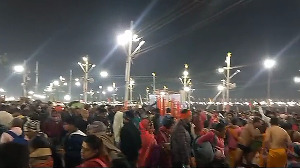'The large-scale movement of US and British troops towards the Gulf and the stepped-up American rhetoric against the Saddam Hussein regime indicate that despite repeated American and British statements that a war is not yet inevitable, these two countries may soon find themselves in a situation where they have to invade Iraq and overthrow Saddam Hussein or face a loss of face. If they decide to attack Iraq, the ability of the Iraqi army to withstand their onslaught or to organise a series of suicide attacks by individual suicide bombers against the allied troops as suggested by Hamas is doubtful.
'What is most likely to happen is that after making a pretense of fighting fiercely against the invaders, Iraqi military formations would cave in. Even more than in 1991, it would be a war dominated from the beginning by the US ability to disrupt and destroy, even before setting foot in Iraqi territory, the command, control and communications capability of the Saddam regime, thereby forcing the individual formations in different parts of the country to meet the allied onslaught without co-ordination and without directions from Baghdad. Saddam's ability to maintain the morale of his forces would be seriously damaged from the beginning. The possibility of a popular uprising against the invading troops, with the armed people taking to a people's war against the allied forces, does not appear very high.' (So I wrote on January 16)
At the very beginning, the Americans are likely to start their hunt for Saddam by relentless, simultaneous bombing of all places where he is known to take shelter even at the risk of large civilian casualties. Their calculation would be that if they eliminate him quickly, the resistance of the Iraqi army could crumble, making the passage of their troops into Baghdad easier and faster.' (So I wrote on February 21)
The US-UK occupation of Iraq, which could come about more rapidly than imagined, possibly even within a week, could lead to three possible consequences. In the immediate and short term, there is a strong possibility of anti-US demonstrations and terrorist attacks. The short and medium term consequence could be the weakening of pro-US governments in the West Asian region. This analysis will confine itself to highlighting the likelihood of demonstrations and terrorist reprisals.
The demonstrations, with or without violence, in the Islamic world, particularly in those countries, which are perceived by their population as allied with the US, overtly or covertly -- such as Pakistan, Egypt and some Gulf countries -- are unlikely to get out of control. However, Pakistan and Egypt would need careful watch. In Pakistan, which is the home of many anti-US fundamentalist and jihadi forces, the demonstrations could be of high intensity, but President Pervez Musharraf should be able to control them without major difficulty if the Pakistan army's corps commanders remain united behind him.
Since General Mohammad Yousef Khan, the vice-chief of the army staff, who is reputed to be even closer to Washington than Musharraf, returned from his visit to the US last month, there have been uncorroborated reports of strained personal relations between the two for unknown reasons. Moreover, there have recently been two intriguing developments in Pakistan, the significance and implications of which are not clear.
The first is the tenacity with which the fundamentalist forces are sticking to their demand that Musharraf should renounce his second hat as chief of the army staff in addition to being the president and that he should seek re-election as president according to the procedure laid down in the constitution. He got himself elected through a referendum in April 2002 for which there is no provision in the constitution.
The second relates to the two unusual press briefings held by the Inter-Services Intelligence on the hunt for Osama bin Laden and the allegations of links between Al Qaeda and the Jamaat-e-Islami, a fundamentalist party. At the first briefing, which was for foreign journalists posted in Pakistan, the briefers gave the impression that the ISI believed bin Laden was alive and possibly in Pakistan and that it was a few hours away from his capture. They were also inclined to agree with the widely-voiced suspicion of links between Al Qaeda and the JEI.
At the second briefing, which was only for Pakistani journalists and followed a few days later, the briefers denied that bin Laden was in Pakistani territory and took the position usually taken by Musharraf that if alive, he was not in Pakistan. They also said while there were instances of individual members of the JEI sheltering Al Qaeda elements, there was no evidence that the JEI as an organisation was colluding with Al Qaeda.
Why these contradictory briefings? Which briefing was held at whose instance? Is there discordance at the top level of the military leadership? Is someone in the army hierarchy instigating the JEI to keep up its campaign for Musharraf's resignation as the COAS and defending the JEI against allegations of complicity with Al Qaeda? Is someone else hitting back at the pro-JEI elements in the military leadership by spreading stories of links between the JEI and Al Qaeda? These questions have been the subject of considerable speculation in Pakistan, but there are no convincing answers.
The indications are that, despite all this, practically all the corps commanders remain united behind Musharraf and are unlikely to do anything which might displease the US. So long as he enjoys their support, Musharraf should be able to deal with any large-scale public demonstrations.
The position in Egypt is not clear. President Hosni Mubarak gives the impression of assured stability in Egypt. Recent years have seen the seeming decimation of the Al Gama Al Islamiya, the jihadi organisation which was active in the 1990s with many attacks on Christians and foreign tourists. There are no indications of any unrest in the army over Mubarak's policies, which are widely perceived by the people as pro-US and anti-Islam. But no one is certain of the extent of fundamentalist penetration in the army and at what level. Large civilian casualties in Iraq and reports/pictures of damages to mosques and historic places associated with Islam could inflame public opinion and make it difficult for Mubarak to control the resulting public anger.
The recent arrest of Khalid Sheikh Mohammad, reportedly No 3 in Al Qaeda, in Rawalpindi has shaken the confidence of Al Qaeda not because this was a great loss to them, but because it showed their increasing vulnerability to action by the US. Consequently, Al Qaeda and the International Islamic Front show signs of being more cautious and less confident of the success of their operations. However, their anti-US motivation and determination to make Israel, the US and the rest of the West bleed remain as strong as ever.
As President Bush said in his address of March 17, reprisal attacks by terrorists are not inevitable, but possible. To thwart such attacks, the US has already upgraded the level of security inside the country to the second highest under an operation reportedly code-named 'OP Liberty Shield.'
Reprisal attacks by terrorists against Israeli, US and other Western targets would most probably come in countries/areas where their capability for attacks remains intact and where in their perception physical security measures are not strong enough to prevent attacks. Such countries/areas are graded as follows in the descending order of probability, with the reasons for grading indicated. These gradings are based on circumstantial evidence and, hence, not error-proof .
Afghanistan and Pakistan
Despite the recent arrests, the Al Qaeda and IIF set-up there remains strong and well-motivated. There is considerable collusion of the religious parties and serving and retired elements from the military-intelligence establishment with the terrorists
India
While Al Qaeda itself has till now had no presence in India, four of the five Pakistani members of the IIF -- namely, the Harkat-ul-Mujahideen, the Harkat-ul-Jihad-al-Islami, the Lashkar-e-Tayiba and the Jaish-e-Mohammad -- have an active presence, mainly in Jammu and Kashmir but also in other parts of India to a smaller extent. The recent increase in terrorist incidents involving them in J&K and other parts of India show that their capability for action remains largely unimpaired despite counter-terrorism measures taken by the Indian agencies.
West Asia
A number of Al Qaeda elements have escaped from Balochistan to Yemen and from there spread to other parts of West Asia. They have considerable local support.
Africa
The terrorist attacks in Tunisia and Kenya last year attested to the unimpaired capability of Al Qaeda and pro-Al Qaeda elements in the region and the local public support enjoyed by them.
South East Asia
Despite the arrests made by the Indonesian authorities after the Bali explosion of October last, the capability of the Jemmah Islamiyah and other organisations aligned with Al Qaeda and the IIF remains strong. While there has been increased intelligence and security co-operation among the countries of the region, the terrorists still retain their capability for surprise action.
Bangladesh
The HUJI, a member of the IIF, has an active presence here.Some Al Qaeda and IIF elements, who escaped from Afghanistan, have taken shelter in Bangladesh territory with the connivance of the local JEI and HUJI.
Europe and the US
The strengthening of security measures in this region post 9/11 has disoriented and disorganised the sleeper cells there. But the failure of local intelligence agencies to identify and neutralise all the sleeper cells should be a matter of continuing concern.






 © 2025
© 2025